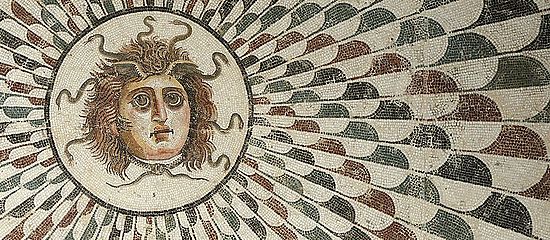
The Basel Doctoral Program in Ancient Civilizations (DBAW)
Admission requirements
The prerequisite for admission to the Basel Doctoral Program in Ancient Civilizations is a qualified dissertation project at the Faculty of Humanities and Social Sciences of the University of Basel, which is supervised by a faculty member of the Department of Ancient Civilizations as first or second supervisor.
Admission is possible at any time and is granted upon application (letter of motivation) and a short project outline (2-3 pages) for the consideration of the executive board, which reviews and evaluates the documents.
For further information, see the Regulations and Procedures of the Basel Doctoral Program in Ancient Civilizations.
Study program
The study program of the Basel Doctoral Program in Ancient Civilizations offers a wide variety of courses and combination options in relation to the spectrum of subjects. Event types encompass research colloquia, workshops, summer schools, junior scholar conferences, lecture series, research seminars, and more.
The doctoral program is designed for a minimum duration of 6 semesters, during which 18 credits must be earned. It consists of two compulsory modules and one elective module.
| Modules | Target credits |
| Disciplinary Course Offers | 9 - 12 |
| Interdisciplinary Course Offers | 6 - 9 |
| Transferable Skills | 0 - 3 |
| Basel Doctoral Program in Ancient Civilizations | total 18 |
Module "Disciplinary Course Offers" (9 - 12 credits).
These courses are usually provided by each subject area and serve to deepen the doctoral students' specialized knowledge as well as to integrate them into current subject-specific research. They aim to provide excellent expert training for doctoral students.
Module "Interdisciplinary Course Offers" (6 - 9 credits).
These events are provided jointly by all subject areas of the Department of Ancient Civilizations. The courses offered in this module can be designed interdisciplinarily or within the narrower framework of specific disciplines. The courses aim to sensitize doctoral students to current questions in related research areas and to integrate their own research or subject area into broader theory-focused scholarly discourses in the domain of cultural studies of antiquity.
Module "Transferable Skills" (0 - 3 credits).
Credits may be awarded for the acquisition of transferable skills (e.g., writing workshops, Scientific English Writing).
Grants in the Doctoral Program
The Basel Doctoral Program in Ancient Civilizations awards travel grants upon application, of a maximum amount of CHF 500 per year.
The following prerequisites apply:
- Funding is only available to doctoral students who hold full membership of the Basel Doctoral Program in Ancient Civilizations.
- A grant will be approved if there are no other possibilities for funding.
- The travel must be directly related to the dissertation project.
- The application must be accompanied by the confirmation of the supervisor.
- The application can only be submitted after completion of the trip. Advance payments are excluded.
- A grant will only be awarded to doctoral students who have not yet completed the fifth year of their dissertation project.
- The application must demonstrate the connection between the dissertation project and the travel. Original receipts must be attached to the application.
- The doctoral student has no claims to funding.
The Basel Doctoral Program in Ancient Civilizations awards grants for workshops upon application, of a maximum amount of CHF 1500.- per year. For doctoral students applying for funding jointly, the maximum request amount is CHF 3000.- per year.
- Only doctoral students who hold full membership of the Basel Doctoral Program in Ancient Civilizations are eligible for funding.
- A grant will be approved if there are no other possibilities for funding.
- The workshop must be directly related to the dissertation project.
- The application must be accompanied by the confirmation of the supervisor.
- A grant will only be awarded to doctoral students who have not yet completed the fifth year of their dissertation project.
- The application must demonstrate the connection between the dissertation project and the workshop.
- No cumulative grant will be awarded.
- The proposal must outline the connection between the dissertation project and the workshop. The application must be accompanied by a budget estimate. In special cases, the money can be paid in advance.
- The doctoral student has no claims to funding.
Applications are to be sent directly to the coordinator of the Doctoral Program (Dr. H.-H. Münch; .
One PhD scholarship (1 year) within the Department of Ancient Civilizations at the University of Basel
The PhD program of the Department of Ancient Civilizations at the University of Basel announces a one-year scholarship à CHF 30'000 (two tranches with evaluation) starting at the 01.04.2024.
Your tasks:
The grant is intended to support a young graduate during the starting phase of his/her PhD research project. It is expected that he/she will develop his/her research project within the first six months for applying to the Swiss National Science Foundation or other funding institutions at the end of that year.
Your profile:
The scholarship is addressed to students who held a 1st class MA‐degree either in Egyptology, Classical Archaeology, Ancient History, Greek Philology, Latin Philology, or European Archaeology. It is expected that the PhD student is highly motivated and will personally be involved in the PhD program of the Department of Ancient Civilizations at the University of Basel. Most welcomed are PhD projects that can be linked to the research fields of the Department of Ancient Civilizations at the University of Basel. Applicants who are about to complete their studies can apply, provided that they can submit an official graduation certificate no later than 07.02.2024.
Application / Contact:
Application deadline: 15.11.2023
The following documents should be sent by email to the coordinator of the Doctoral Program of Basel Ancient Studies Mr. Hans-Hubertus Muench (hubertus.muench@clutterunibas.ch):
- Letter of motivation
- CV
- MA-Diploma
- 1-2 sample of text (max. 20 pages each, including at least 1 academic qualification text, e.g. BA or MA Thesis)
- Sketch for the dissertation project (max. 3 pages)
- Letter of reference
Applications can be submitted in German, in French, or in English. The enrolment at the University of Basel is mandatory. The first supervisor must be a member of the Department of Ancient Civilizations at the University of Basel. For further information, please contact the coordinator of the Doctoral Program of Basel Ancient Studies Dr. Hans-Hubertus Muench (hubertus.muench@clutterunibas.ch).
Doctoral students in the program
Martin Allemann
Spätantike Befunde und Funde im Westteil des Basler Münsterhügels
abstract
Güleser Aydin
Kult der Aphrodite in Kleinasien
abstract
Sara Baldin
The Agrarian Economy of Roman Egypt
abstract
Marta Billo-Imbach
Funeraltopographie der Picener am Beispiel einer Gräbergruppe aus Matelica (Arbeitstitel)
abstract
Lukas Bohnenkämper
Das Expeditionswesen des Mittleren Reiches
abstract
Simon Bühler
Synergetic Spaces, Peripheral Images: The Politics of Late Roman and Early Christian Mosaics of the Eastern Levant
abstract
Laurence Cappa Dafflon
(Titel folgt)
Olivia Denk
Kulte und Heiligtümer auf der Chalkidike – Untersuchungen zur Sakraltopographie im Kontext historisch-politischer Ereignisse (1200 v. Chr. - 300 n. Chr.)
abstract
Lauren Dogaer
Mix and Match: Contextualising the socio-cultural factors of the Late Funerary Literature (working title)
abstract
Amanda Gabriel
„Was, wenn nicht Ethnien?“ Eine netzwerkanalytische Perspektive auf die Vielfalt spätantiker und frühmittelalterlicher Bestattungen zwischen Bodensee, Hochrhein und Genfersee.
abstract
Claudia Gamma
Keramikateliers klassischer Zeit in Eretria: kultureller Treffpunkt (Arbeitstitel)
abstract
Pedro Garcia-Baro Huarte
Der Philosoph und seine Bücher: eine Neubewertung der Natur der Papyrusbibliothek von Herculaneum dank der materiellen Philologie
abstract
Tancrède de Ghellinck d’Elseghem Vaernewijck
L’iconographie du programme funéraire dans les tombes thébaines du Nouvel Empire égyptien. Évolution des pratiques funéraires et de leurs représentations.
abstract
Ilaria Gullo
Die Grabsitten des 6. Jh. v. Chr. in der Sibaritide anhand der Grabinventare der archaischen Nekropole von Francavilla Marittima (IT)
abstract
Miriam Hauser
Die Bronzezeitliche Siedlung von Riehen-Haselrain
abstract
Charlotte Hunkeler
Manufacture, Iconography, and Epigraphy of Inner Coffins as a Mirror of Continuity and Change of Funerary Practice During the Transitional Phase of the 22nd to the 25th Dynasty (First Millennium) in Thebes (Arbeitstitel)
abstract
Jacqueline M. Huwyler
Of Culture Contact and Identities: The Introduction of Anat into Egypt, Nubia, and Sinai (ca. 1985-1069 BCE)
abstract
Tarek Khalil Mohamed Khalil
Studying the Tombs of the Middle and the Lower Social Levels in the Western Field at Giza Necropolis
abstract
Sandra Kyewski-Ditz
,Wilde‘ Tiere in Rom – Konzepte nicht-heimischer Fauna in der römischen Antike (Arbeitstitel)
abstract
Bernhard Krieter
The transition of the 3rd-4th c. Roman Anatolia: change, continuity, break
abstract
Cheyenne Peverelli
Palaepaphos (Cipro) in età classica. Analisi funzionale e socio-culturale del materiale ceramico di un quartiere abitativo
abstract
Enrico Regazzoni
Metallgeschirr der ersten Hälfte des 1. Jts. v. Chr. zwischen Westanatolien und dem Ägäisraum (Arbeitstitel)
abstract
Niccolò Savaresi
Rethinking Collapse: the fall of Sybaris (ca. 510 BC) and the transformation of Greek colonial space
abstract
Sarah Siegenthaler
Life and Death at the Margins of Society – Investigating Manifestations of Poverty within Roman Urban Spaces
abstract
Elsayed Mamdouh Soliman
A Re-Discovered Ramesside Tomb In Qurnet Marei: TT 382 (Usermontu) - An Archaeological and Epigraphic Study
Ulrich Stockinger
Andernach/Antunnacum: Eine Militär- und Zivilsiedlung am Rhein. Kaiserzeitliche und spätantike Funde und Befunde der Grabungen auf dem Gelände der Weissheimer Mälzerei 2008–2014
abstract
Cinzia Tuena
The Hecatomnid Dynasty – Gender and Power in the Persian-Greek border region
abstract
Simeon Tzonev
Die politische Repräsentation der Ptolemäer. Monarchische Legitimation und Herrschaftsrezeption in der multiethnischen und polyzentrischen Gesellschaft des hellenistischen Ägypten (Arbeitstitel)
abstract
Audric Wannaz
Eine Korpusstudie zum Inhalt und zur Struktur der familiären Privatbriefe der griechisch-römischen Zeit (Arbeitstitel)
abstract
Lucas Weisser-Gericke
The City of Heracleopolis magna in Roman Times. An Urban Biography
abstract
Simone Zurbriggen
Die kaiserzeitliche Keramik von Eretria
abstract
Associated
Vera Allen
If you hurt me, I erase you. Iconoclasm in Old Kingdom Élite Tombs
https://eikones.philhist.unibas.ch/de/personen/vera-elizabeth-allen/
Geirr Kristian Homme Lunden
Variety in emic reinterpretations of marsh motifs in ancient Egyptian elite tombs
https://eikones.philhist.unibas.ch/de/persons/geirr-kristian-homme-lunden/
Stephan Unter
The Classification and Reconstruction of Fragmentary Documents with Machine Learning. A Case Study in Ancient Egyptian Papyri
http://web.philo.ulg.ac.be/x-bound/stephan-unter-research-project/
Graduates
Cyprian H.W. Fong (2025)
As Long as the Divine Names Endure: A Study of the Invocation for Endurance in Graeco-Roman Funerary Texts
abstract
Rahel C. Ackermann (2025)
Archäologische und numismatische Untersuchungen zur Münzstätte im Schloss Haldenstein GR
abstract
Barbara Hufft (2025)
Inszenierung von Königtum in der 25. Dynastie: Studie zu visuellen Darstellungsstrategien der kuschitischen Herrscher in Ägypten und Nubien
abstract
Sophia Joray (2025)
Räumliche Organisation und kulturelle Praktiken in einer mittelbronzezeitlichen Siedlung. Auswertung der Fundstelle Gränichen-Lochgasse (AG)
abstract
Adrienne Cornut (2024)
Der Vierte Stil. Ein neuer Blick auf Gestaltungsprinzipien, Ikonographie und das Zusammenspiel von Decorphänomenen in vier pompejanischen Wohnhäusern
abstract
Elena Luise Hertel (2024)
Palimpsests among the Heterogeneous Papyri from Deir el-Medina: Scribal Practices and (Re)Use in a Comparative Perspective
abstract
Julia Kretschmer (2024)
Whose Voice? Exploring the Phenomenon of ‘Speaking Objects’ from the Late Geometric to the Classical Periods (8th-5th c. BCE)
abstract
Margaux Depaermentier (2023)
Mobilität, Sozialstrukturen und Lebensweise im spätantiken Basilia und im frühmittelalterlichen Bazela
abstract
Daniele Furlan (2022)
The interaction of infantry, cavalry and chariots in Neo-Assyrian war tactics
abstract
Philipp Gleich (2022)
Die "Goldberg-III-Gruppe": Polykulturelles Zusammenleben in Oberschwaben im frühen dritten Jahrtausend v. Chr.?
abstract
Tobias Krapf (2022)
La céramique de Sovjan (Albanie) du Bronze Moyen au Fer Ancien dans son contexte égéo-balkanique
abstract
Marina Sartori (2022)
Between the (Brush)lines. Script- and Figure-Pictoriality in New Kingdom Theban Tombs
abstract
Ann-Kathrin Stähle (2022)
Sidonius Apollinaris, Poetik des Bruchs
abstract
Elisabeth Weber
Trauer und Trost in Basels neulateinischen Epicedien
abstract
Emanuele Casini (2020)
Reassessing the Valley of the Queens: Archaeological, social, and archival research with particular focus on the New Kingdom
abstract
Julianna Kitti Paksi (2020)
Diglossia and the Function of Linguistic Variety in the Ramesside Texts
abstract
Katharina Suter-Meyer (2019)
Geographie als Mittel zum rerum cognoscere causas in der Welt des Wissens und der Gelehrten – Eine Analyse der Kommentare des Humanisten Joachim Vadians zur antiken Weltbeschreibung des Pomponius Mela
abstract
Frederik Rogner (2019)
Raum und Narrativität in der Flachbildkunst des ägyptischen Neuen Reiches
abstract
Eugenio Garosi (2019)
The Ambivalence of Language: Expression of Power and Administrative Function in Arabic Documents from Early Islamic Egypt
abstract
Matthias Stern (2019)
Der Pagarch. Finanzverwaltung, Lokalpolitik und soziale Kontrolle im byzantinischen Ägypten
abstract
Katharina Vogt (2019)
Meir – Die Nekropole im Mittleren Reich. Eine Archivgrabung
abstract
Anna Flückiger (2018)
Kaiseraugst zwischen Spätantike und Frühmittelalter. Eine siedlungsarchäologische Studie
abstract
Anne-Sophie Meyer (2018)
Natur und Krieg: Lucans Bellum Civile kontextualisiert
abstract
Laura Diegel (2017)
Aliquid nostris rebus lucis adferre. Life writing am Ende der römischen Republik und zu Beginn der Kaiserzeit
abstract
Christian Guerra (2015)
Enea Silvio Piccolominis Commentarii de rebus a se gestis - Gattungtheoretische und narratologische Überlegungen vor dem Hintergrund der antiken Geschichtsschreibung
abstract
Hannes Flück (2015)
An der Ausfallstrasse nach Augusta Raurica - Auswertung eines Handwerkerquartiers in der Zivilsiedlung West des Legionslagers von Vindonissa
abstract
Cédric Scheidegger Lämmle (2015)
Ille ego. Werkpolitik in der antiken Literatur
abstract
Rainer Nutz (2014)
Zu den ökonomischen Grundlagen der Gesellschaftsstruktur in der 12. Dynastie
abstract
Former
Florence Becher-Häusermann
Théodore Tronchin (Theodorus Tronchinus), Geneva, 17th century correspondence: transcription, translation, commentary
Salome Bertschi
Soziale Mitgliedschaften von professionellen Arenakämpfern der römischen Antike (Arbeitstitel)
abstract
Serena Causo
The Crisis of the Irrigation System in Third Century Egypt
abstract
Audrey Crabbé
Multi-discplinary studies on the human-animal relationship in Deir el-Medina and the wider Theban area during the New Kingdom (working title)
abstract
Doaa Elalfy
Historically Marginalized Greco-Roman Physicians
abstract
Valerie Muhmenthaler
Die weibliche Partizipation an den offiziellen sportlichen Wettkämpfen von der griechischen Spätklassik bis zur römischen Kaiserzeit (4. Jh. v. – 4. Jh. n. Chr.)
abstract
Yasmin Müller
Zugänglichkeit, Vermittlung und Erfahrung von funerärem Wissen im Alten Ägypten (Arbeitstitel)
abstract
Simon Christian Raith
The Fayum in Late Aniquity: Society and Economy in the 3rd and 4th centuries
abstract
Gaëtan Schaller
Le latin mérovingien; étude linguistique des documents originaux et non littéraires du 7ème et 8ème siècle.
abstract
Stefania Tateo
Property Rights in Graeco-Roman Egypt
Stephan Unter
The Classification and Reconstruction of Fragmentary Documents with Machine Learning. A Case Study in Ancient Egyptian Papyri
Jakob Zeller
Narrativität und Landschaft in den Werken des Petrus Martyr Anglerius (1457-1526)
abstract
Interdisciplinary offerings such as the annual graduate conference are dedicated to cultural research on antiquity, are methodologically and theoretically oriented, and include sociological issues (e.g., domination, ethnicity, religion, gender, economics, migration) or cultural and art studies issues (e.g., image-text relations, iconography, aesthetics).
Upcoming Graduate conference
Graduate conferences of the past years
Location: Hotel Odelya, Missionsstrasse 21, 4055 Basel
Organizer:
Dr. Ana Zora Maspoli (Provinzialrömische Archäologie) und Cheyenne Pevereli (Klassische Archäologie)
Die Macht der Handlungen. Soziale Praktiken als Schlüssel zum Verständnis der Vergangenheit // The Power of Actions. Exploring the Past through Social Practices

Location: Kollegienhaus, Sitzungszimmer 206
Organizer:
Ana Maspoli, Cheyenne Peverelli (Department of Ancient Civilizations, University of Basel)
Discard Practices: Archaeological and Anthropological Approaches
Workshop for doctoral and master students - open to BA-students and participants from other universities.Location: Am 10.12: Alte Universität, Besprechung 003 / Am 11.12: Alte Universität, Seminarraum -201
Organizer:
Basel Doctoral Program in Ancient Civilizations (DBAW), Organizers: Laurence Cappa Dafflon, Christine Luz Martin
The Future of Epigraphy. From Manual Copying to Digital Reconstruction - Workshop

Location: Rosshof, Schnitz (Rosshofgasse), S01
Organizer:
Basel Doctoral Program in Ancient Civilizations (DBAW), Organizers: Laurence Cappa Dafflon, Christine Luz Martin
The Future of Epigraphy. From Manual Copying to Digital Reconstruction - Public Lecture

Location: Hotel Odelya, Missionsstrasse 21, 4055 Basel
Organizer:
Dr. Stefania Alfarano (Fachbereich Alte Geschichte) & Sara Baldin, MA (Fachbereich Alte Geschichte)
Humans and the Landscape(s): An Everlasting Story of Mutual Interactions

Location: Bildungszentrum 21/Hotel Odelya, Missionsstrasse 21, 4055 Basel
Organizer:
Dr. Matthias Müller (Fachbereich Ägyptologie) & Niccolò Savaresi, MA (Fachbereich Klassische Archäologie)
Borders? Borders! Separation Lines, Joining Spaces
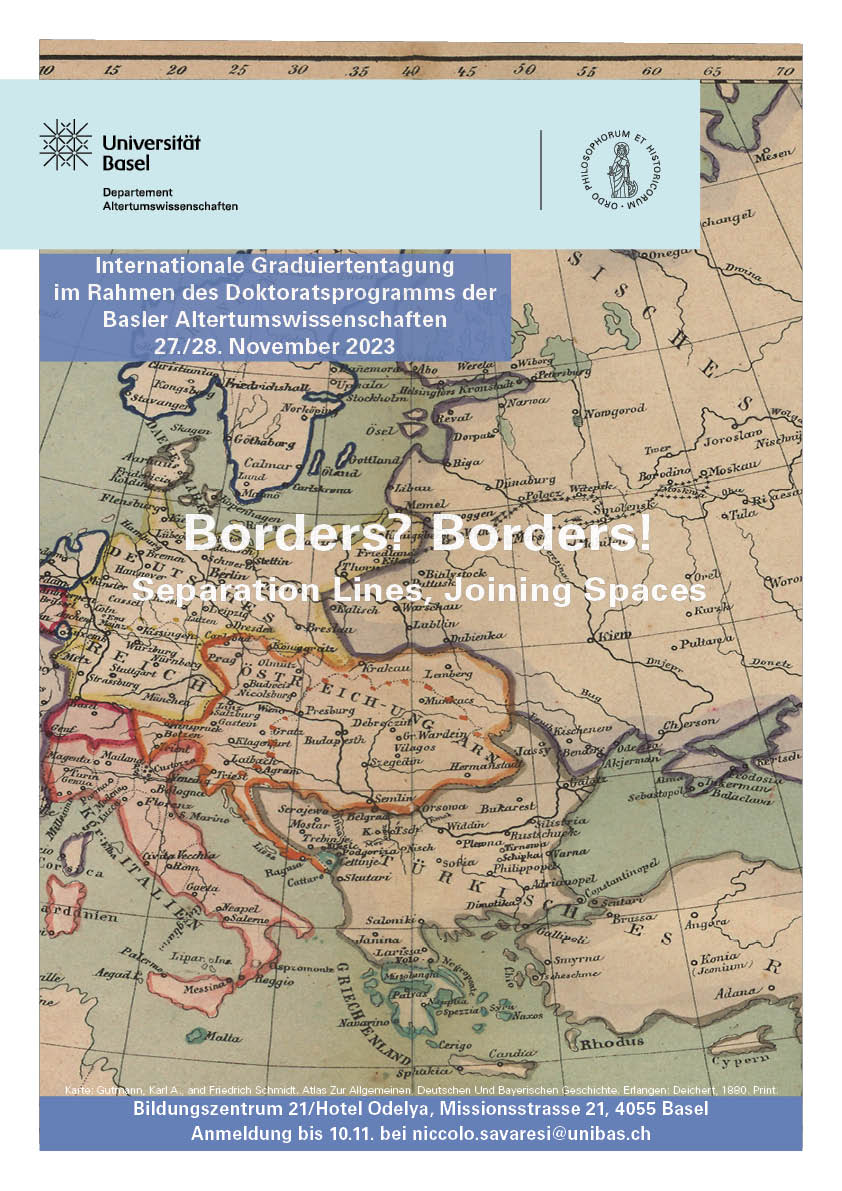
Location: Bildungszentrum 21/Hotel Odelya, Missionsstrasse 21, 4055 Basel
Organizer:
Dr. Matthias Müller (Fachbereich Ägyptologie) & Niccolò Savaresi, MA (Fachbereich Klassische Archäologie)
Borders? Borders! - The Workshop

Location: Bildungszentrum 21/Hotel Odelya, Missionsstrasse 21, 4055 Basel
Organizer:
Dr. Stefania Alfarano (Fachbereich Alte Geschichte) & Jacqueline M. Huwyler, M.A. (Fachbereich Ägyptologie)
"Wer bin ich?" Kulturkontakt und Identität (Entstehung, Pflege und Veränderung) in der Antike
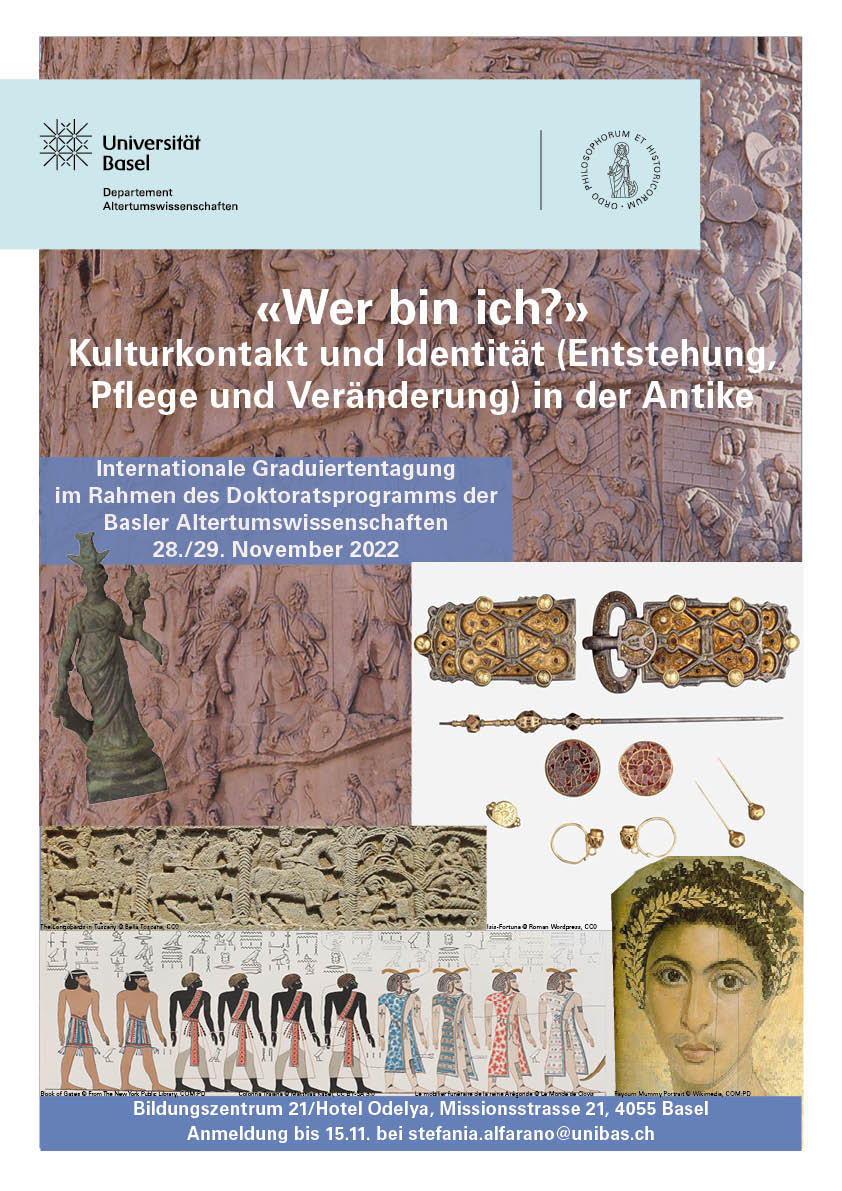
Location: Bildungszentrum 21 Missionsstrasse 21, 4055 Basel Aufgrund der Covid19-Pandemie sowohl vor Ort als auch auf der Plattform Zoom
Organizer:
Dr. Christine Luz Martin (Fachbereich Gräzistik) und Marina Sartori MA (Fachbereich Ägyptologie)
„Aus alt mach neu“: Wiederverwertung, Weiterverarbeitung und Recycling in der antiken Welt
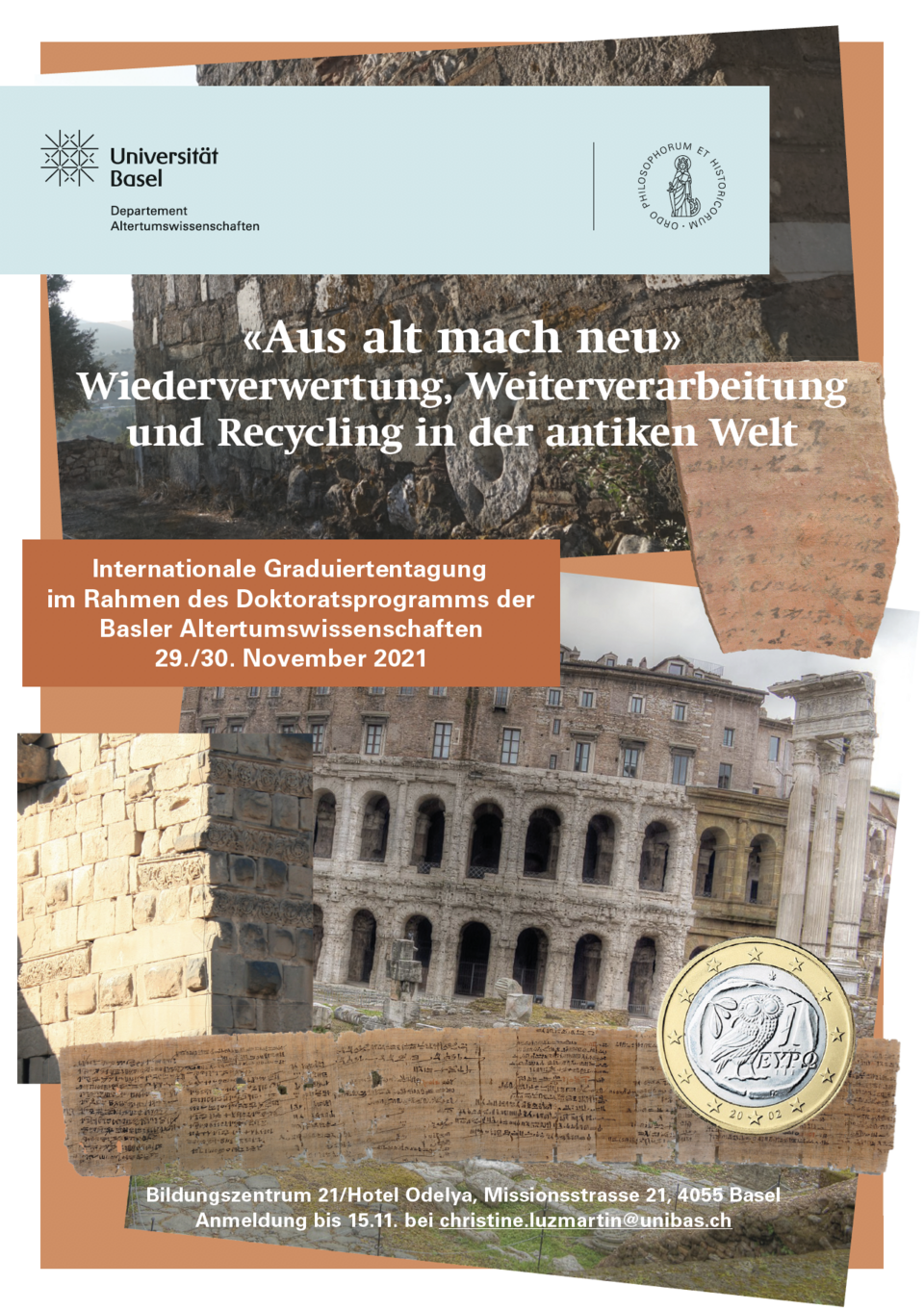
Location: Digital Aufgrund der Covid19-Pandemie auf der Plattform Zoom
Organizer:
Dr. Ana Zora Maspoli (Fachbereich Provinzialrömische Archäologie - Vindonissa Professur) und Ilaria Gullo MA (Fachbereich Klassische Archäologie)
Wohin des Weges? Mobilität und Migration im Altertum
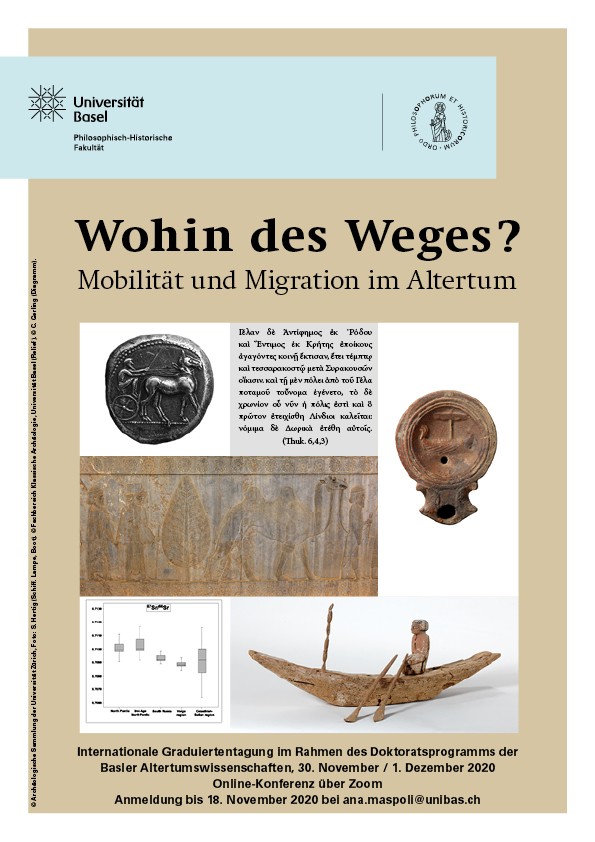
The Transferable Skills programme is aimed at all doctoral students and postdocs at the University of Basel. The programme provides support during the doctoral and postdoctoral phase and prepares researchers for new and further research and professional activities within and outside the university. The courses offer doctoral students and postdocs at the University of Basel a free programme for creative and interdisciplinary exchange. The faculty's programme can be found at the bottom of the page.
Fall semester 2025
Online registration for the autumn semester 2025 will open on Wednesday, 6 August 2025, at 9 am. After the registration window opens, course registrations will be collected for 24 hours and places will then be allocated by lot. All registrations received after the first 24 hours will be placed on a waiting list according to the time of receipt of the registration.
The following events of the Doctoral Programme in Ancient Civilizations will take place in the fall semester 2025.
Graduate Conference:
“The Power of Actions. Social Practices as a Key to Understanding the Past // The Power of Actions. Exploring the Past through Social Practices”
Monday and Tuesday, 24 & 25 November
Conference hotel Odelya
Further dates will follow shortly.
This page contains useful links on the subject of promotion.
This page is updated on regularly.
Guide:
https://www.zeit.de/campus/ratgeber-promotion/index
https://pphs.unibas.ch/wp-content/uploads/2015/12/Leitfaden_Erfolgreich-promovieren_2015_WEB.pdf
Executive Board of the Doctoral Program
Chair of the Executive Board
Scientific coordination
Representative of Group I
PostDoc Representative
PhD Representative
Quick Links
